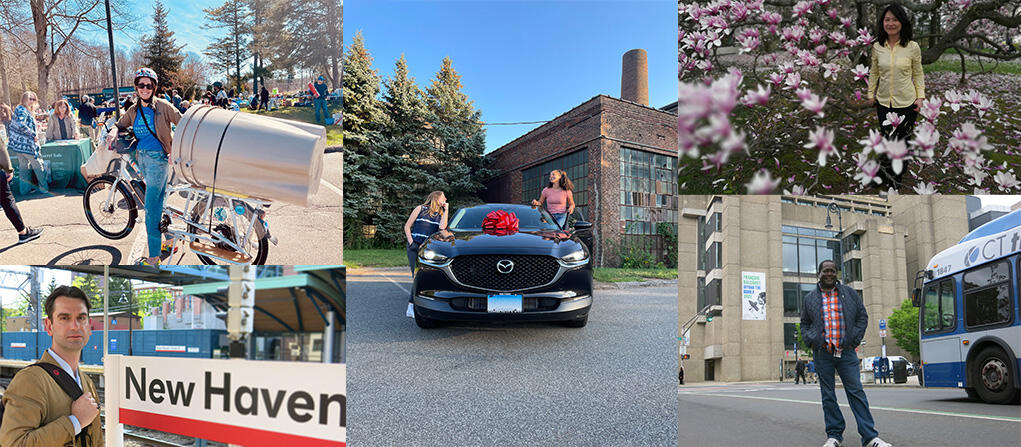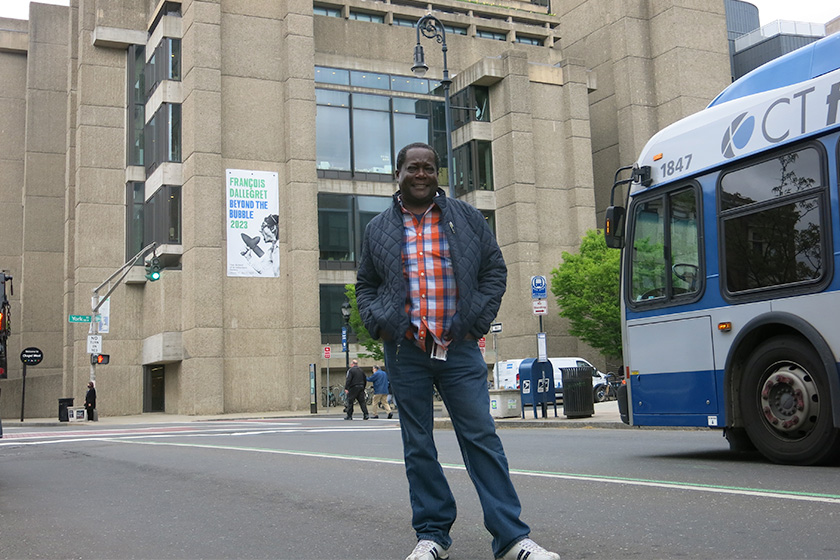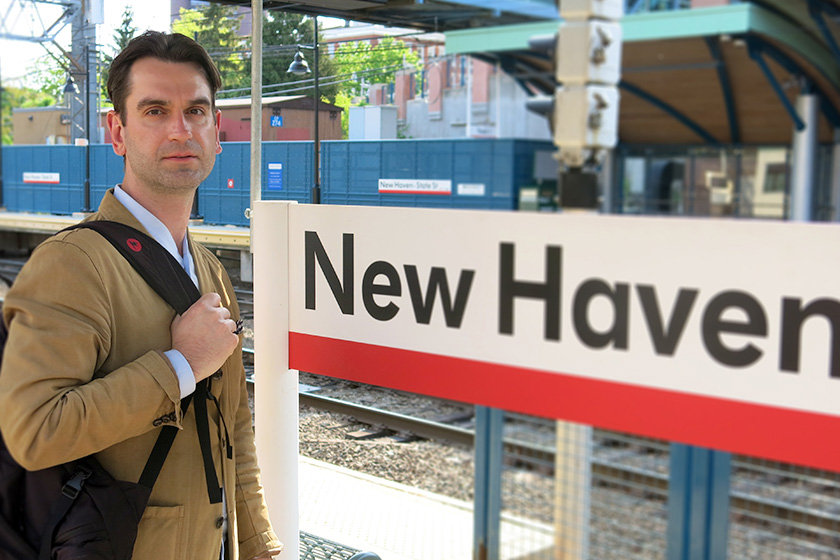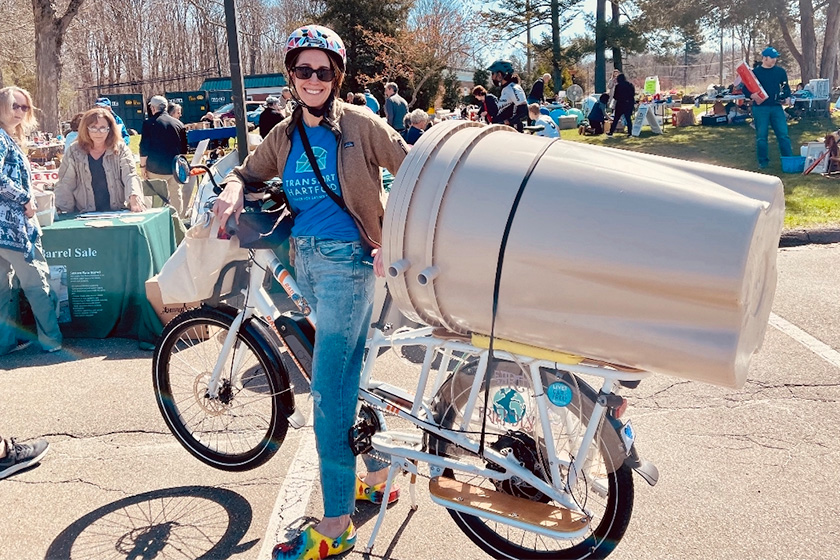
There is no way out of the climate crisis that doesn’t involve a rapid shift in how we move around.
Globally, transportation is responsible for 37% of greenhouse gas emissions (in Connecticut that number is 38%). After a pandemic-induced decline, transportation emissions have quickly rebounded to pre-2020 levels. And while electric-vehicle sales are booming, they still account for fewer than one in five new cars sold.
Despite those troubling trendlines, people everywhere—including hundreds of Yale employees—make a daily choice to commute to work sustainably. They are commuting by foot, bus, train, bike, shuttle, or rideshare. It’s a choice that requires some sacrifice, but that is outweighed by benefits to health, happiness, and the environment.
Not to mention cost savings: The average household could save $10,000 a year by learning to live with one less car. Yale employees who commute sustainably are eligible for a host of benefits—including the ability to use pre-tax income for transit fares, free parking passes on days you need to drive to work, and a guaranteed ride home in case of emergency.
In this article, five Yale employees talk about the advantages—and challenges—of choosing a sustainable commute, providing lessons and inspiration for anyone considering leaving their car at home.
Bus

Terence Brown’s morning bus commute to Yale School of Architecture is painless, thanks to years of public transit riding that have fine-tuned his morning routine down to the minute.
“My morning prep is based off the ‘Today’ show,” explains Brown, who serves as Senior Administrative Assistant for Academic Support at the School of Architecture. “The first commercial after the 8 o’clock hour comes at 8:07. When I see that commercial, that’s when I know I need to be out the door.”
Brown’s CTtransit bus rounds the corner toward his house in New Haven’s Edgewood neighborhood at 8:11 a.m. By 8:20, Brown is at his desk, supporting the dean and the School’s 264 graduate students.
Brown’s car is a Cadillac Escalade, so taking the bus saves him considerably on gas as well as parking. For $63, he can buy a monthly bus pass—purchased at a kiosk on the New Haven Green or at Stop & Shop—that takes him to and from work and to meet friends around greater New Haven. (CTtransit also sells 7- and 10-day ride passes).
On top of the cost, the bus eliminates the hassles of driving.
“I find driving to be stressful—too many cars on the road, driving fast just to get nowhere,” Brown says. “I like the comfort of just sitting back and relaxing. You get to see things you don’t notice when you’re driving.”
The main challenge of bus commuting is sticking to the strict schedule, Brown says. “I have to be up at a certain time, have clothes pressed by a certain time, and be out the door on the corner,” he says.
Needing to run home unexpectedly during the work day—a common concern for those considering swapping their car for public transit—hasn’t been a problem for Brown. “I just catch the bus at Chapel Street heading west, get dropped off at the house, do what I need to do, and walk back. I could do that in a lunch break and it would take 40 minutes tops.”
Brown’s advice to those considering a switch to bus commuting: “You’re going to save money, and your stress level is going to go down.”
Train

The commute Ronnie Rysz takes to and from Yale could be called “lanes, trains, and no automobile.”
First comes a short walk from his Guilford home to the nearby Shore Line East station, during which “sunrises and songbirds are a daily performance.”
Next, Rysz hops a westbound train for the 20-minute trip to New Haven. On board he has time to read (usually about art, culture, economics, or global politics), catch up with family and friends via phone, answer work emails, or simply chat with his wife, Tori, or a colleague who is also en route.
From the State Street station, it’s a 10-minute walk to his building, where Rysz works as Communications Manager for the Office of Facilities. If he’s early, he’ll sometimes grab a quick breakfast at Koffee? or Olmo. At the end of each day, it’s the same commute in reverse.
If that sounds like an extremely civilized way to get to work, Rysz would agree.
“Commuting by rail is cheaper, encourages me to walk, provides me space for recreation, allows for social interaction, decreases my carbon footprint—all within a similar amount of time it would take to drive,” says Rysz, a longtime rail commuter who took Metro North for years for school in Manhattan and jobs in Fairfield County. “It’s a win all around.”
Rysz is among the many Yale employees who use pre-tax income to purchase transit passes by enrolling in the university’s commuter benefits program. Those benefits also entitle him to three free parking stays a month on occasions when he must drive to work, as well as a guaranteed ride home in case of emergency.
On occasion, the train does experience delays due to severe weather or equipment malfunctions, Rysz notes. But for him, investments made in Shore Line East recently—including the replacement of diesel-powered cars with electric ones—outweigh the downside of those occasional disruptions.
“Depending on your proximity to a trainline and work location, commuting by rail may offer you a better quality of life than sitting in traffic and fighting for parking,” Rysz advises. “If it’s available to you, consider it as a more sustainable way to travel.”
Bike

Kate Rozen has been commuting to Yale by bicycle from her home in Woodbridge since 2019. Initially, she made the 11-mile roundtrip trek on a regular pedal bike, but a long, steep climb on the ride home made that impractical.
So she purchased an electric-powered cargo bike for the daily commute to Yale School of Architecture, where she serves as Senior Executive Assistant to the Dean.
“I used to drive an SOV,” says Rozen, using an acronym for single-occupancy vehicle. “I knew I wanted to make the switch because it felt like something I should be trying to do as someone who cares about sustainability.”
Rozen is an experienced and dedicated cyclist who has successfully advocated for bike-friendly legislation at the state level. And yet she had some of the same concerns as anyone about ditching her car commute.
“People have hesitancy about making the shift, especially working parents because they worry about not being able to get to their child quickly,” says Rozen, whose daughter, Audrey, rides on a passenger seat on the back of the bike frame. “But honestly, I can get home to my house in the same or less time as taking a car, because I can take different routes and don’t get caught in traffic.”
From Woodbridge, that route travels down Fountain Street through upper Westville where Rozen can veer onto Edgewood Avenue with a cycle track that provides some buffer from car traffic. She takes safety seriously, outfitting her bike with a mirror, a bell, and a light with turn signals. Having the right all-weather gear—rain pants and a cover to keep her handlebars dry—are also essential for bike commuting success.
For Rozen, the benefits of bike commuting are many and include improved cardiovascular health. “I have taken up tennis, which is something I never would have done before.”
Rozen doesn’t have to guess about positive impacts of her zero-carbon commute: she logs her miles with CTrides, which calculates the benefits of her cycling. To date, she has pedaled 2,532 miles—saving her $1,480, preventing 1.1 tons of emissions, burning 75,000 calories, and saving 116 gallons of gas.
Anyone curious about switching to a bike commute should take a bicycle safety course, Rozen advises, either with Yale Environmental Health and Safety or the New Haven Coalition for Active Transportation. Beyond that, she says, the key is “to just do it.”
Walk

Chuanmei Sun used to live in Hamden but moved to New Haven’s East Rock neighborhood so she could walk to work.
Sun is a Senior Lector in the Department of East Asian Languages and Literature. Each morning, she makes the 20-minute walk from her home on Edwards Street to her classroom in the Watson Center or her office on Church Street.
Strolling down Orange Street or Whitney Avenue, she often listens to NPR on headphones while taking time to notice all the plants, local shops, and cafes. In the evening, if weather permits, she likes to walk with friends to East Rock Park.
“I drive only for grocery shopping,” Sun says. “There are lots of benefits of walking to work: reducing fossil fuel consumption, saving money, saving the planet.”
Walking helps Sun maintain good health and eliminates the stress of driving in traffic. She also lives a short walk from parks (East Rock and Edgerton are favorites), hiking, and museums, and visits them frequently.
Sun says she does occasionally hop the Yale Shuttle to get to work—a reminder that sustainable commuting doesn’t have to be an all-or-nothing proposition. After almost a year of walking to work every day, it’s now become a routine—one that Sun values as part of an active, sustainable lifestyle.
Rideshare

For a long time, Christine Jolly’s commute to Yale involved walking across the New Haven Green. But when Jolly and her wife, Ann Marie, found a home they loved in Middletown—a place with enough room to raise a family someday—the self-described “city dweller” had to rethink her commute.
The couple decided driving to work together in one car was the way to go.
Christine works as Associate Director for Academic Affairs and Student Life at Yale School of Management. Her wife works as an Animal Research Assistant at Yale School of Medicine. Their work schedules don’t align perfectly (Ann Marie needs to arrive more than an hour earlier than Jolly) but carpooling best fit their budget and their values around sustainability.
“The benefits outweighed the freedom of driving separately,” says Jolly. “We use our commute to spend really valuable time with one another, not to mention all of the money we save and the gas we don’t use.”
To be sure, the arrangement isn’t without its drawbacks. Parking in the garage at Evans Hall is not inexpensive, Jolly notes, and she ends up working fewer days remotely because Ann Marie is required to work in-person five days a week. Plus, while Yale’s Commuter Benefits Program provides perks for employees who rideshare, Jolly and Ann Marie aren’t able to take advantage of them because they live in the same household.
Still, the arrangement has more upside than downside. The 35-minute commute in their Mazda CX-3 gives the couple regular chances to catch up about their lives and plans, and Jolly has come to value that time. Owning just one car saves significant money on car payments, gas, maintenance, and insurance. And being tied to one another’s daily schedules helps them set healthy boundaries around work hours.
“It holds me accountable to not over-extending myself at my job,” says Jolly.
To anyone considering switching to ridesharing, Jolly’s advice would be, “Even if you prefer the solace of riding on your own, there’s so much impact you can make on New Haven and on our community that it’s worthwhile to make the change.”
Learn more about Yale’s award-winning Commuter Benefits Program.